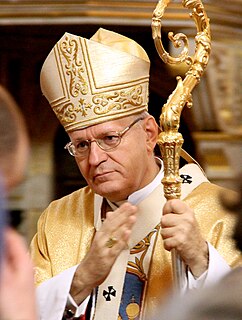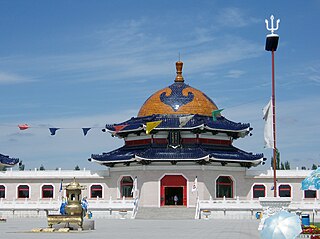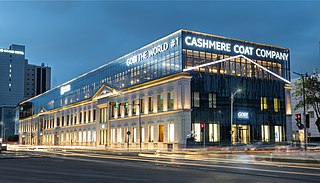Erdos Group (also Inner Mongolia Erdos Group Co., Ltd.) [1] is a Chinese conglomerate valued at approximately 60.8 billion RMB (US$9.5 billion) with interests in cashmere, energy, and metallurgy. [2]
Erdos Group (also Inner Mongolia Erdos Group Co., Ltd.) [1] is a Chinese conglomerate valued at approximately 60.8 billion RMB (US$9.5 billion) with interests in cashmere, energy, and metallurgy. [2]

The economy of Mongolia has traditionally been based on agriculture and livestock. Mongolia also has extensive mineral deposits: copper, coal, molybdenum, tin, tungsten, and gold account for a large part of industrial production. Soviet assistance, at its height one-third of Gross domestic product (GDP), disappeared almost overnight in 1990–91, at the time of the Collapse of the Soviet Union. Mongolia was driven into deep recession. Reform has been held back by the ex-communist MPRP opposition and by the political instability brought about through four successive governments under the DUC. Economic growth picked up in 1997–99 after stalling in 1996 due to a series of natural disasters and increases in world prices of copper and cashmere. Public revenues and exports collapsed in 1998 and 1999 due to the repercussions of the Asian financial crisis. In August and September 1999, the economy suffered from a temporary Russian ban on exports of oil and oil products. Mongolia joined the World Trade Organization (WTO) in 1997. The international donor community pledged over $300 million per year at the last Consultative Group Meeting, held in Ulaanbaatar in June 1999. Recently, the Mongolian economy has grown at a fast pace due to an increase in mining and Mongolia attained a GDP growth rate of 11.7% in 2013. However, because much of this growth is export-based, Mongolia is suffering from the global slowdown in mining caused by decreased growth in China.

Hohhot, abbreviated Hushi, formerly known as Kweisui, is the capital of Inner Mongolia in the north of the People's Republic of China, serving as the region's administrative, economic and cultural center. Its population was 2,866,615 inhabitants as of the 2010 census, of whom 1,980,774 lived in the built-up area made up of 4 urban districts.

Cashmere wool, usually simply known as cashmere, is a fiber obtained from cashmere goats, pashmina goats, and some other breeds of goat. It has been used to make yarn, textiles and clothing for hundreds of years. Cashmere is closely associated with the Kashmir shawl, the word "cashmere" deriving from an anglicisation of Kashmir when the Kashmir shawl reached Europe in the 19th century from Colonial India. Common usage defines the fiber as wool, but it is finer, stronger, lighter, softer and approximately three times more insulating than sheep wool. Both the soft undercoat and the guard hairs may be used; the softer hair is reserved for textiles, while the coarse guard hair is used for brushes and other non-apparel purposes.

Pashmina refers to a fine variant of spun cashmere, the animal-hair fibre forming the downy undercoat of the Changthangi goat. The word pashm means "wool" in Persian, but in Kashmir, pashm referred to the raw unspun wool of domesticated Changthangi goats. In common parlance today, pashmina may refer either to the material or to the variant of the Kashmir shawl that is made from it. Both generic cashmere and pashmina come from the same goat, but generic cashmere ranges from 12–21 microns in diameter, whereas pashmina refers only to those fibres that range from 12–16 microns.

Chifeng, also known as Ulankhad, is a prefecture-level city in Southeastern Inner Mongolia, People's Republic of China. It borders Xilin Gol League to the north and west, Tongliao to the northeast, Chaoyang (Liaoning) to the southeast and Chengde (Hebei) to the south. The city has a total administrative area of 90,275 square kilometres (34,855 sq mi) and has a population of 4,341,245 inhabitants. As of the 2010 census, 1,094,970 of those residents reside within in the urban districts of Hongshan, Yuanbaoshan and Songshan. However, a large part of Songshan is still rural and Yuanbaoshan is a de facto separate town 27 kilometers away from the core district of Chifeng. The city was the administrative center of the defunct Ju Ud League.

Péter Erdő is a Hungarian Cardinal of the Latin Rite of the Catholic Church. Erdő currently serves as the Archbishop of Esztergom-Budapest, and thus Primate of Hungary.

A cashmere goat is a type of goat that produces cashmere wool, the goat's fine, soft, downy, winter undercoat, in commercial quality and quantity. This undercoat grows as the day length shortens and is associated with an outer coat of coarse hair, which is present all the year and is called guard hair. Most common goat breeds, including dairy goats, grow this two-coated fleece.
E. Thomas is an Italian fabric mill established in Brusimpiano in 1922 by Ernesto Thomas. The mill's fabrics include a range of blends combining wool with silk, Chinese and Mongolian cashmere, mohair and linen. The mill is located on the Italian shore of Lake Lugano.

A deel is an item of traditional clothing commonly worn since centuries ago among the Mongols and other nomadic tribes of Central Asia, including various Turkic peoples, and can be made from cotton, silk, wool, or brocade. The deel is still commonly worn by both men and women outside major towns, especially by herders. In urban areas, deels are mostly only worn by elderly people, or on festive occasions. The deel appears similar to a caftan or an old European folded tunic. Deels typically reach to below the wearer's knees and fan out at the bottom and are commonly blue, olive, or burgundy, though there are deels in a variety of other colors.

The Ejin Horo Banner, also known as Ejin Horo Qi or Yijinhuoluo County, is a banner in Ordos City in southwestern Inner Mongolia, China. It borders Shaanxi Province to the southeast. As of 2009, the Ejin Horo Banner covers an area of almost 5,600 square kilometres (2,200 sq mi), with a population of nearly 160,000, the majority of whom are ethnically Han Chinese.

The Oyu Tolgoi mine is a combined open pit and underground mining project in Khanbogd sum within the south Gobi Desert, approximately 235 kilometres (146 mi) east of the Ömnögovi Province capital Dalanzadgad. The site was discovered in 2001 and is being developed as a joint venture between Turquoise Hill Resources with 66% ownership and the Government of Mongolia with 34%. The mine began construction as of 2010 and shipped its first batch of copper on 9 July 2013.

The Mongolian Stock Exchange (MSE) is Mongolia's sole stock exchange. It is based in Ulaanbaatar. It was established in January 1991 by the decree of the Mongolian Government to privatize state-owned assets,.

Yili Group is China's market-leading dairy products producer and is listed as an “A Share” company on the Shanghai Stock Exchange. It is engaged in processing and manufacturing of milk products, including ice cream, milk tea powder, sterilized milk and fresh milk under "Yili" brand, powdered milk under "Pro-Kido" brand, and organic milk under "Satine" brand. It is headquartered in Hohhot, Inner Mongolia. Its main competitor in China is Mengniu. In 2018, it is the world's 3rd best-performing food brands.

Holingol is a county-level city of Inner Mongolia, China.

Tavan Bogd Group is a Mongolian conglomerate with 14 subsidiaries and four affiliates in trades and services, manufacturing, financial services and mining supplies along with restaurant, tourism and hospitality businesses in Mongolia. Established in 1995, Tavan Bogd Group is one of the largest corporations in Mongolia, officially representing some of the world’s best-known brands such as Toyota, Volkswagen, Hitachi mining equipment, Colgate Palmolive, TOTO, L’Occitane, KFC, Pizza Hut, Bridgestone, Heinz, Funai, Xerox and Double A. In addition, Tavan Bogd Group sells luxury cashmere products through the GOBI Corporation, which currently operates about 140 boutique stores in 40 countries.
Malo is an Italian luxury brand of cashmere, started in Florence in 1972 by brothers Alfredo and Giacomo Canessa.

Mining is important to the national economy of Mongolia. Mongolia is one of the 29 resource-rich developing countries identified by the International Monetary Fund and exploration of copper and coal deposits are generating substantial additional revenue. Coal, copper, and gold are the principal reserves mined in Mongolia. Several gold mines are located about 110 kilometres (68 mi) north of Ulaanbaatar, such as Boroo Gold Mine and Gatsuurt Gold Mine. Khotgor Coal Mine is an open-pit coal mining site about 120 kilometres (75 mi) west of Ulaangom. Ömnögovi Province in the south of Mongolia is home to large scale mining projects such as the Tavan Tolgoi coal mine and the Oyu Tolgoi copper mine. Oyu Tolgoi mine is reported to have the potential to boost the national economy by a third but is subject to dispute over how the profits should be shared. The International Monetary Fund (IMF) has estimated that 71 percent of the income from the mine would go to Mongolia.
Brunello Cucinelli S.p.A. is an Italian luxury fashion brand which sells menswear, women's wear and accessories in Europe, North America and East Asia. The brand has deeply rooted moral values, such as being a "humanistic enterprise" and using craftsmanship to lend moral dignity to both the artisan and the owner.
Brunello Cucinelli is an Italian luxury creative director and the chief executive of his eponymous made in Italy brand, Brunello Cucinelli. He donates 20% of his profits through the Brunello Cucinelli Foundation. He has been described as a "philosopher-designer".

Gobi Corporation(Mongolian: ГОВЬ ХК) is a Mongolian cashmere manufacturer co-headquartered in Ulaanbaatar, Mongolia.
| This China-related article is a stub. You can help Wikipedia by expanding it. |